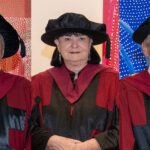A Curtin University of Technology academic has become the first physicist to lead a major section of chemistry’s peak international body.
Dr Robert Loss, Head of Curtin’s Department of Imaging and Applied Physics, was recently elected President of the Inorganic Division of the International Union of Pure and Applied Chemistry (IUPAC).
“It’s certainly not the standard situation,” he said.
“However, I definitely couldn’t say no. Being given a chance to take on a position within an organisation that operates at a global scale like this is a rare opportunity.”
Dr Loss is also the first Australian scientist to hold the position in quite some time.
Originally joining the Union through the Commission on Isotopic Abundance and Atomic Weights, Dr Loss was appointed Divisional Vice-President two years ago.
When the position of President became vacant earlier this year, he decided it was an opportunity that he couldn’t pass up.
“This is an exciting time to be involved in IUPAC,” Dr Loss said.
“We are already supporting more than 100 projects around the world, and with 2011 being the Year of Chemistry, this activity will likely increase.
“Through this and other initiatives, we will continue to bring together scientists from all around the world to boost international collaboration and promote the importance of chemistry to the wider community.
“One of the most interesting aspects of being President will be working with a large team of leading international scientists from a wide range of cultures, who all have very different ways of working.”
The IUPAC Division of Inorganic Chemistry is charged with evaluating and publishing fundamental inorganic chemical data for science commerce and trade, and recommending funding for projects from all around the world.
An example of an ongoing activity is the approval of the names and symbols of newly-discovered elements.
“We actually have several elements we are in the process of naming,” Dr Loss said.
“One is element number 112 and we are working with the discoverers and the chemical community to come up with a name that’s a little more interesting.”


